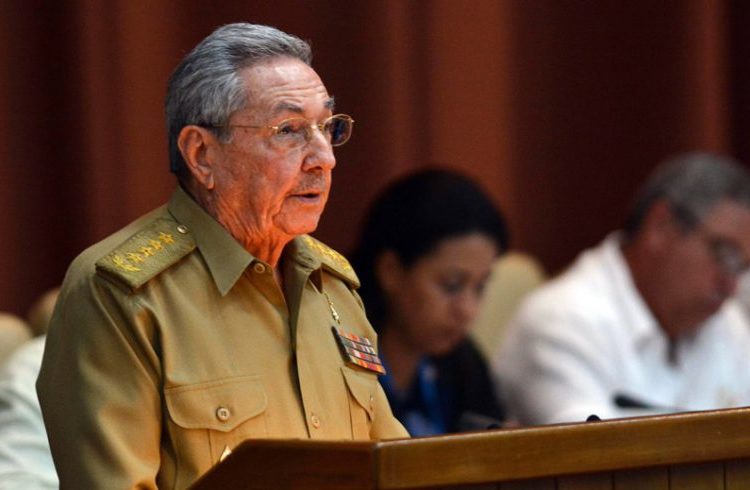Raúl Castro affirmed last Friday that “stigmas or prejudices” will not be allowed regarding self-employment on the island and asked the incipient private sector to respect the laws and comply with its tax-paying obligations.
The Cuban president pointed out in his speech of the first of the two annual plenary meetings of the National Assembly of People’s Power (Parliament) that the functioning of self-employment and the non-agricultural cooperative will not back down or stop.
In Cuba, where for decades the State had the absolute control over the workforce, today there are more than half a million private workers and 400 cooperatives whose flourishing forms part of the reforms promoted by the Cuban president to update the economic model.
Although the president, according to what the state-run media reported, recognized the “validity” of those forms as sources of employment and their “acceptable quality levels,” he also deplored “the occurrence of deviations and illegalities in the exercise of the new forms of work.”
He cited among those illegalities the use of raw materials and equipment of illegal origin, tax evasion and the inadequacies in state control.
The Cuban government recently announced the approval of new control measures to regulate self-employment and keep in check those problems, but they still haven’t been made public.
In addition, Parliament approved in an extraordinary session last June the latest version of the “Raúlista” reforms, which recognize the existence of private enterprise within the new socialist model although they ratify that the accumulation of wealth or property will not be allowed.
The Cuban president admitted that when applying those reforms there has been “an excess of enthusiasm and wishes to advance at a faster pace than we are actually capable of.”
The president also confirmed that the Cuban GDP grew 1.1 percent in the first semester of the year, an “encouraging” data after 2016 registered a negative result of 0.9 percent, the country’s first recession in 23 years.
However, he recognized the existence in this period of financial tensions and problems with the availability of fuel. He was referring to the repercussion on Cuba of the crisis in Venezuela, a country that according to foreign estimates has reduced by half its shipments of subsidized oil to the island, which last April led to restrictions in the sale of premium gasoline.
He highlighted, on the other hand, positive aspects like the improvement of the domestic currency balance and maintaining free education and healthcare.
He also underlined the “rigorous carrying out” of the financial commitments with the principal creditors, one of the country’s priorities after the agreement to reorganize the debt achieved in December 2015 with the Paris Club member countries.
According to what Minister of the Economy Ricardo Cabrisas announced on Friday to Parliament, between January and June the island paid 2.306 billion dollars to its creditors.
However, there are still delays in the payment to suppliers, recognized Castro, who insisted on the will to settle those debts.
NO LESSONS ON HUMAN RIGHTS FROM THE U.S, OR ANYBODY
The Cuban president affirmed that on human rights Cuba has many achievements about which it feels proud and “doesn’t have to receive lessons from the United States or anybody else,” in what was his first public mention of the change of policy of the Donald Trump administration toward the island, announced in June.
In his address to the Cuban Parliament’s plenary meeting Raúl Castro considered those measures an “intensification of the unilateral siege” and warned that any strategy to “destroy the Revolution through coercion or other subtle measures” will fail.
The Cuban president, according to the state-run media’s reports, described the new measures announced by Trump last June 16 in Miami, which subordinate the ties with the island to respect for human rights, the holding of free elections and the release of political prisoners, as a “rollback” in bilateral relations.
The Trump Republican administration has intensified some of the regulations of the economic embargo on Cuba that his predecessor, Barack Obama, relaxed as part of the diplomatic thaw between Cuba and the United States initiated in December 2014.
The changes approved by Trump include banning Americans from doing business with companies linked to the GAESA state conglomerate, considered the economic arm of the Revolutionary Armed Forces and with commercial interests in many sectors, especially tourism.
Trump also announced his intention of imposing new restrictions for Americans’ travel to Cuba, who although they still can’t travel to the island as tourists have already become the second issuing market of visitors thanks to the facilities that Obama gave to “people-to-people” contacts.
For Raúl Castro, those measures – which will be officially announced by the Office of Foreign Assets Control (OFAC) next September 15 – imply “the return to an old and hostile rhetoric, proper of the cold war.”
The Cuban president insisted that Trump’s decisions have no knowledge of the support of extensive U.S. sectors and of the majority of the Cuban diaspora in that country for the “lifting of the economic, commercial and financial blockade and the normalization of relations, while they satisfy a small Florida group.”
However, Raúl Castro, who will leave the Cuban presidency in February 2018, reaffirmed the island’s will to continue the dialogue and cooperation with the United States and the negotiation of pending matters “based on equality and respect for Cuban sovereignty and independence.”
“Cuba and the United States can cooperate and coexist respecting the differences and promoting all that which benefits our peoples,” specified 86-year-old Castro, who presided last Friday over the regular session of the National Assembly of Cuba in which laws were approved about the management of water and climate change.
OnCuba / EFE










